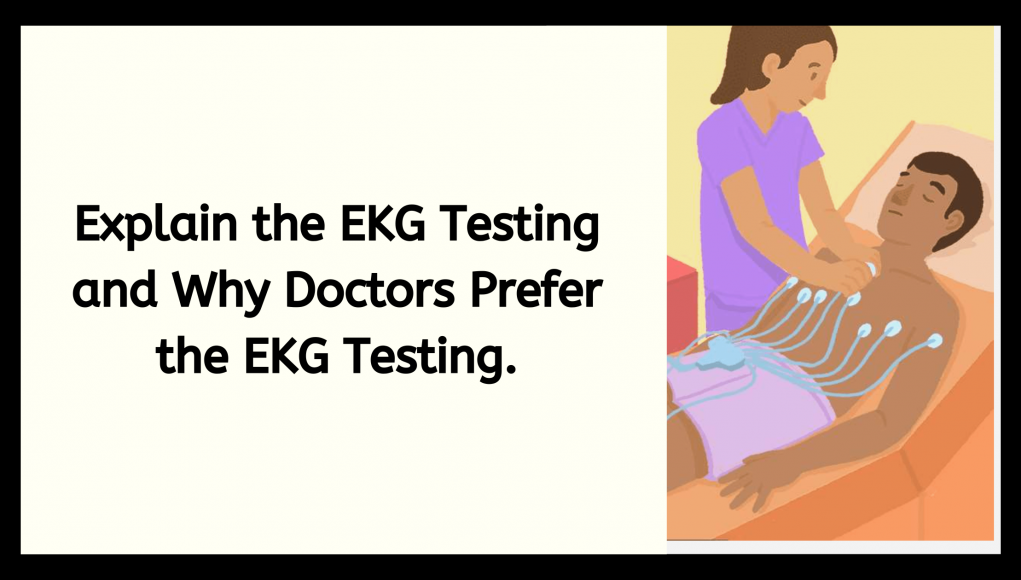An EKG is a quick, painless test that doctors use to measure the electrical activity of your heart. This contrasts with other medical procedures that promise to be “largely” accessible but aren’t. It’s essential to know how the electrical system in your heart works because electrical impulses control the rhythm and speed of your heartbeat.
Getting to Know Your EKG
During an electrocardiogram (EKG or ECG), also called an EKG, sensors are placed on your chest in certain places to measure your heart rate and rhythm. Each sensor has a patch that sticks to your skin without hurting you and a small wire that goes back to your EKG machine.
After a trained technician puts the sensors or leads in, you lie still for a minute while the equipment records your heartbeat and gives you a printout (trace) of what it saw. Then, your technician will take the wires off of your device.
Most of the time is spent connecting and unplugging the up to 12 test leads, which can take anywhere from 5 to 10 minutes. The glue may feel wet or cold when you first put the lead on your skin. You shouldn’t feel anything when the EKG is doing its job.
After that, your doctor will review the results, showing your heart rate, rhythm, and the strength of electrical impulses as they move through your organs and blood vessels. Patients with heart rates that are too slow or too fast, arrhythmias, or strange electrical signals should be looked at more closely. During an EKG, stress testing can find signs of a recent or ongoing cardiovascular event, structural problems like an enlarged heart, and insufficient oxygen or blood flow to the cardiac muscle.
Different EKG Tests
Your doctor may suggest the following types of electrocardiograms in addition to the standard EKG:
Holter monitor.
With this portable EKG, you can monitor your heart’s electrical activity for up to two days, 24 hours a day. Your doctor may suggest it as a last resort if they think your heartbeat is too fast or slow or if you have palpitations.It is entirely painless, just like a typical EKG. You can resume your routine after installing them, but you will not be allowed to shower. List all the things you do each day, along with any symptoms that may be present. Your doctor gives you specific instructions.
Event monitor
Your doctor may advise you to use this device if you only sometimes experience symptoms. When you press a button, the electrical activity of your heart will be recorded and saved for a few minutes. You might have to wear it for a few weeks or even months. If you start to feel sick, you should look at the monitor. Your doctor will look over what you tell them over the phone.
Why do doctors prefer EKG testing?
Your doctor may recommend getting an electrocardiogram or EKG to look for signs of heart issues. Small electrode patches are applied to your chest, arms, and legs by a specialist to record the electrical activity of your ticker.
- Electrocardiograms (ECGs) can be done quickly, don’t hurt, and are safe. Your doctor will use the results of this test to:
- Keep an eye on how fast your heart is beating.
- Make sure enough blood gets to your heart muscle (this is called ischemia)
- Find a heart attack as soon as it starts.
The heart muscle getting thicker is one sign that something is wrong.
Note any changes in the body’s electrolytes, like if the potassium or calcium levels are too high or too low.
Why you should get an EKG
Doctors can use EKGs to find problems with the heart or to keep an eye on issues already there. An EKG can help with the following:
Figure out what’s causing your chest pain.
The cause of fluttering in the chest must be found.
Check for shortness of breath, pain in the chest, and other heart-related signs.
• You should investigate whether your heart rate is too rapid or sluggish.
• Watch out for heartbeats that aren’t regular, like a missed beat.
• Examine your heart’s overall health.
• Before and after surgery, get your heart monitored.
• Get checked out to see if medicine for your heart is working.
• Check out how a pacemaker works.
The health history of your immediate family may also indicate that you need an EKG. A patient’s medicine could also make them more likely to have heart problems or abnormalities, and an EKG can help find these problems.
Getting an EKG could also make you feel safer. An EKG can rule out major health problems and help you stop worrying about health concerns if you’ve been experiencing odd chest pain or other indicators that could be related to your heart.
Conclusion:
If you have chest pain, have a history of heart disease, or have any of these other risk factors, your doctor may suggest that you get an EKG stress testing. When problems are found, it may be necessary to do more tests. For that, you need to find on Google “EKG testing locations near me“ to get a complete picture of the situation and determine the best way to handle it.














